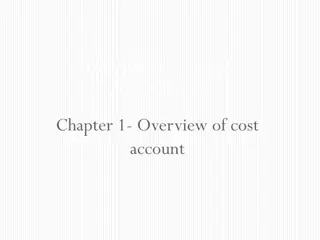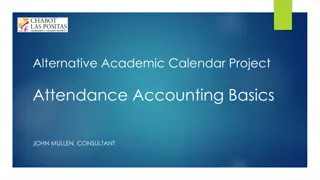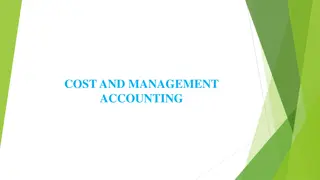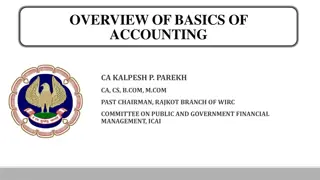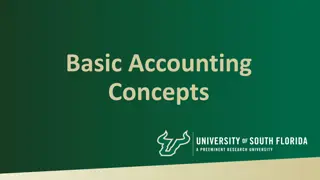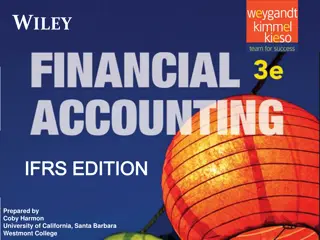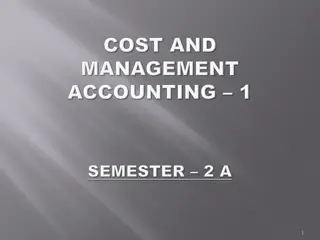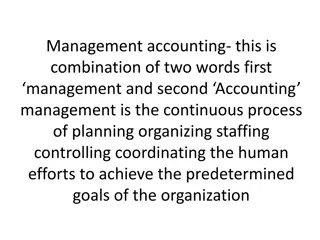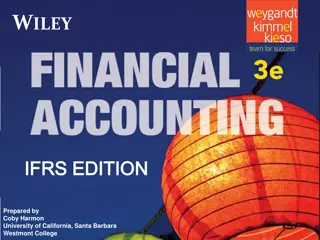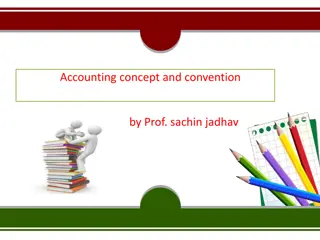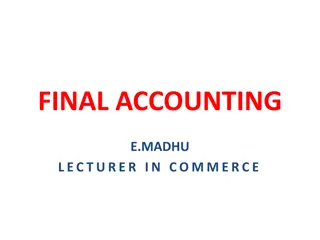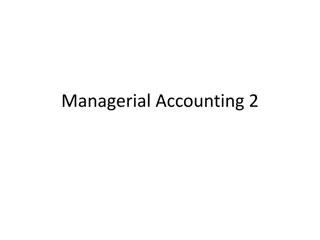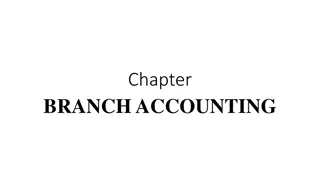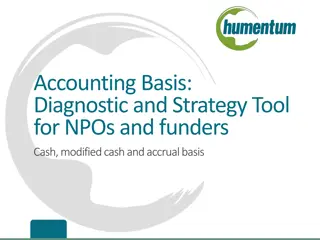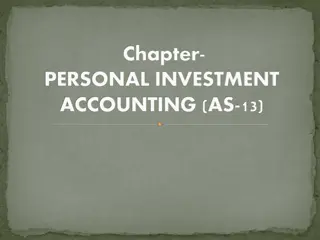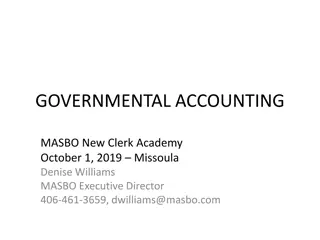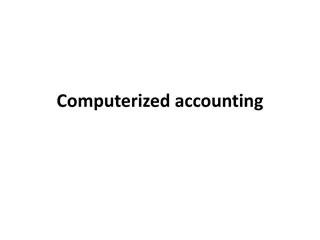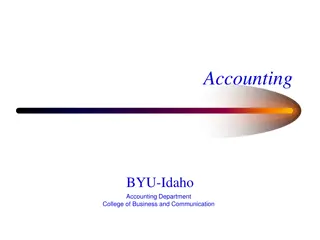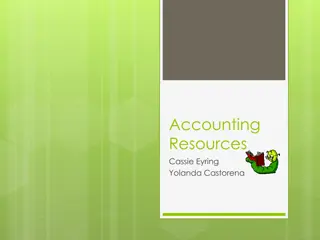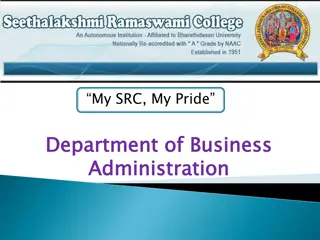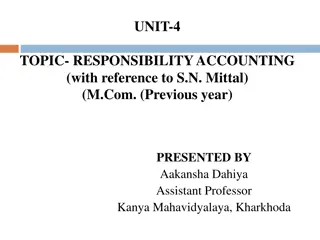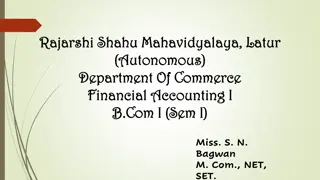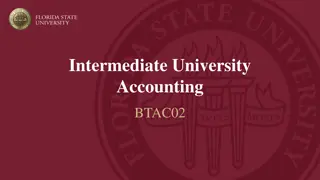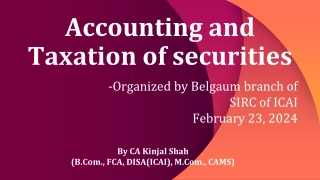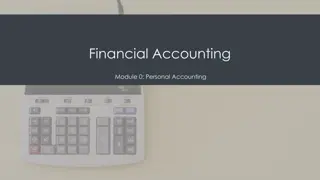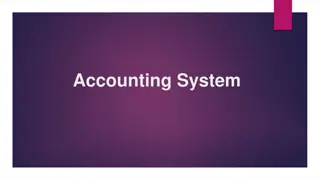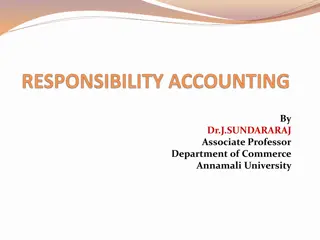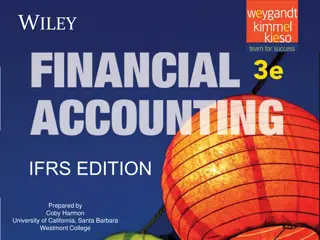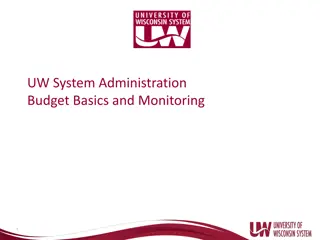Understanding Accounting Concepts and Principles
Accounting serves as the universal language of business, enabling communication of financial results and positions to stakeholders. To ensure clarity and consistency, Generally Accepted Accounting Principles (GAAP) provide a set of rules guiding the preparation of financial statements. Key concepts like Business Entity and Money Measurement help in accurately recording transactions. These fundamental principles evolve with changing business needs, shaping the foundation of accounting practices.
Download Presentation

Please find below an Image/Link to download the presentation.
The content on the website is provided AS IS for your information and personal use only. It may not be sold, licensed, or shared on other websites without obtaining consent from the author. Download presentation by click this link. If you encounter any issues during the download, it is possible that the publisher has removed the file from their server.
E N D
Presentation Transcript
Accounting is the language of business. The results of a business along with its financial position are communicated through the means of accounting information to its proprietor, managers and other interested parties that is creditor, investors, Financial Institutions, government, etc. information should be systematically summerized and presented. So that each party could easily understand it. It is essential that the accounting information should be based on a standard language and some certain established rules. These rules are called Generally Accepted Accounting principles (GAAP). The meaning of the word principle is that fundamental truth which can be accepted at all places in the same manner. The universal principles of accounting provide a basis to the determination and presentation of the results of the business transactions and events. These principles are traditional and have developed on the basis of experience, reason, custom, uses and practical necessity. In the past, accountant had two confront many account related problems from time to time for which they found solutions. And these solutions when accepted by other University became principals. Accounting principles are neither static nor confined. It implies that they keep changing with the passage of time according to the need of the business circumstances. Therefore, the accounting classified, recorded, Principles of Accounting
In order to make the accounting language convey the same meaning to all people and to make it more meaningful, most of the Accountants have agreed on a number of concepts which are usually followed for preparing the financial statement. These concepts provide a foundation for accounting process. No enterprise can prepare its financial statements without considering these basic concepts or assumptions. These concepts guide how transaction should be recorded and reported. Accounting concepts and Assumption
According to this concept, business is treated as a unit separate and distinct from its owners, creditors, managers and others. In other words, the owner of a business is always considered as distinct and separate from the business he owns. Business unit should have a completely separate set of books and we have to record business transactions from firms point of view and not from the point of view of the proprietor. Business Entity concept
Only those transactions and events are recorded in accounting which is capable of being expressed in terms of money. An event, even though it may be very important for business, will not be recorded in the books of business unless its effect can be measured in terms of money with a fair degree of accuracy. Money Measurement Concept
Going concern Principle As per this concept, it is assume that the business will continue to exist for a long period in the future. The transactions are recorded in the books of the business on the assumption that it is a continuing Enterprise.
As the business is intended to continue infinitely for a long period, the true result of the business operation can be ascertained only when the business is completely wound up. But ascertainment of profit after a very long period will be of little used to the proprietor, managers, investors and others because it will be too late to take corrective steps at that time. The users of the financial statements need to know the result of business at frequent intervals. Thus, the entire life of the firm is divided into time intervals for the measurement of the profit of the business. 12 month period is usually adopted for this purpose. Accounting period concept
Cost According to this concept, an asset is ordinarily recorded in the books of account at the price at which it was acquired. This cost becomes the basis of all subsequent accounting for the assets. concept or historical cost concept
According to this concept, every business transaction is recorded as having a dual aspect. In other words, every transaction affects at least two accounts if one account is debited, any other account must be credited. The system of recording transaction based on this concept is called double entry system. It is because of this principle that the two sides of the balance sheet are always equal and the following accounting equations will always hold good at any point of time. Dual aspect concept Assets = liabilities + Capital or Capital =Assets - liabilities
Revenue means the amount which is added to the capital as a result of business operations. Revenue is earned by sale of goods or by providing a services. Concept of revenue recognition determine the time or the particular period in which the revenue is realized. Revenue is Deemed to be realized when the title or the ownership of the goods has been transferred to the purchaser and when he has legally become liable to pay the amount. It should be remembered that revenue recognition is not related with the receipt of cash. Revenue recognition or realization concept
This concept is very important for correct determination of net profit. According to this concept, in determining the net profit from business operations, all costs which are applicable to revenue of the period should be charged against that revenue. Accordingly, for matching costs with revenue, first revenue should be recognised and then cost incurred for generating that revenue should be recognised. Matching concept
In transactions. It provides more appropriate information about the performance of business Enterprise as compared to cash basis. Accrual concept applies equally to revenue and expenses. In accrual concept, revenue is recorded when sales are made or services are rendered and it is immaterial whether cash is received or not. Similarly, according to this concept, expenses are recorded in the accounting period in which they assist in earning the revenues whether the cash is paid for them or not. accounting, accrual basis is used for recording of Accrual concept
This concept requires that accounting transactions should be recorded in an objective is manner, free from personal bias of either management or the accountant who prepares the accounts. It is possible only when each transaction is supported by verifiable document and vouchers such as cash memos, invoices, sales bill, pay in slip, correspondence agreements etc. Objective concept


